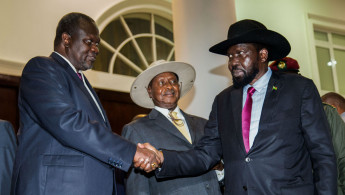South Sudan rivals again agree power sharing deal, days after US skepticism about peace
It comes days after the US said it was "skeptical" the two men - whose rivalry has killed tens of thousands - could lead the way to peace.
The new agreement comes amid growing pressure from the international community on President Salva Kiir and armed opposition leader Riek Machar to end the fighting.
Under the threat of a UN arms embargo, the former allies agreed to resume talks in June in what was their first face-to-face discussions in nearly two years.
Sudanese Foreign Minister Al-Dirdiri Mohammed Ahmed said that the deal will be signed on 5 August.
The deal will see Kiir lead South Sudan's government with Machar as one of five vice presidents during a transitional period, according to Sudan's official SUNA news agency.
A similar arrangement had fallen apart in July 2016, when Machar was forced to flee the country after fighting erupted in the capital, Juba.
South Sudan descended into civil war in 2013, when supporters of President Kiir clashed with loyalists of his then-deputy Machar.
Over 2 million people have since fled the country in Africa's largest refugee crisis since the Rwandan genocide in 1994, while millions of others have been left near famine.
Multiple cease-fires, including a "permanent" one signed by Kiir and Machar weeks ago, have been violated within hours. Meanwhile, both sides have been accused of abuses.
A UN report this month described how government troops and allied forces hung people from trees, burned others alive and raped or gang-raped dozens of women and girls.
The US earlier this week warned that another power-sharing agreement between Kiir and Machar "may sow the seeds of another cycle of conflict."
The White House press secretary's statement said the US won't fund South Sudan's government or act as guarantor unless the peace process includes civil society, churches, women and other excluded groups and is no longer a "narrow agreement between elites".





 Follow the Middle East's top stories in English at The New Arab on Google News
Follow the Middle East's top stories in English at The New Arab on Google News
![Israeli forces ordered bombed Gaza's Jabalia, ordering residents to leave [Getty]](/sites/default/files/styles/image_330x185/public/2176418030.jpeg?h=a5f2f23a&itok=_YGZaP1z)

